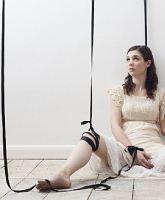A Doll's House - Arcola Theatre 2011
First produced in 1879, 'A Doll's House' is one of Henrik Ibsen's best-known plays. The house in question is the home of the Helmer family. Torvald Helmer has just been made manager of the local bank which will place the family's fortunes on a firmer footing. This has enabled his wife Nora to buy Christmas presents and to look forward to improvements in her life. But that is not to be, at least in the near term, as the Governor of the Bank of England is fond of saying. Nora raised a loan at the bank with a guarantee that she forged. An employee at the bank - Krogstad - threatens to reveal this fraud to Torvald unless Nora can persuade her husband to secure Krogstad's job which is under threat.
Gina Abolins starts off as a mousey, deferential Nora, who lives in fear of her husband, anxious to please him like a small child. By the end of the play, she has made a remarkable transformation into a confident, capable woman who is prepared to go her own way and take whatever life can throw at her, but do it for herself, relying on her own judgement.
Although we find ourselves justifiably sympathising with Nora, I also felt considerable sympathy for Krogstad who can't rid himself of his past and the reputation which goes with it. Maligned by almost everyone, Krogstad is, like Nora, fighting for his very existence. He's powerfully and convincingly played here by Alexander Gatehouse.
Dominik Golding also proves convincing in his portrayal of Torvald Helmer. Though there are times when the way he treats and speaks to his wife make one cringe, he's not a wife -beater. But I don't doubt that there would be those who would say the way he treats her is, psychologically speaking, a crime against the person anyway. Mr Golding's Torvald is a prim, proper bureaucrat, insensitive to his wife's needs.
This version of 'A Doll's House' is by Space Productions and mixes puppetry, physical theatre and sound. The set is almost entirely white, symbolising Nora's naivety, child-like innocence and what seems more like a filial than uxorial relationship with her husband. Small cups, ornaments and picture frames hang from the ceiling, and Torvald's study lies at the far side of the set, so that Nora's husband is ever-present in the background as events unfold.
This is one of the best examples of fringe productions - willing to take risks based on sound analysis, a strong vision and confident creativity. It isn't quite perfect, but it's heading in the right direction. I was not entirely convinced about the role of the Norns - three metaphorical, mythological characters who symbolise Nora's past, present and future. The choreographed, physical aspects of their interaction with Nora are interesting and well-executed, but ultimately I felt confused about what these characters were telling us. The prolonged, piercing sound effects are poignantly effective, but assaulted the ears as much as the senses. Otherwise, there's meticulous attention to detail and the cast is strong, and well-directed.
Ibsen's work is a proto-feminist play which had a powerful effect on audiences in the late nineteenth century, and it is still one that modern audiences can relate to on all kinds of levels. Alex Crampton's stimulating and enjoyable production builds on that power, whilst injecting fresh perspectives and some provocative modernity.
Originally published on
